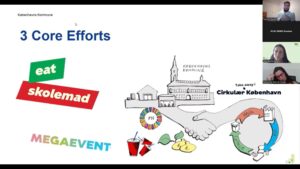Event
Webinar recap: Promoting the reuse of containers and packaging in Latin American cities

“Why create waste to recycle, when we can avoid it in the first place?”
How can cities in Latin America advance reusable packaging systems within their jurisdictions? This was the central question that guided the discussions in the webinar “Reusable Packaging Systems: Opportunities in Latin American Cities”, hosted by ICLEI South America on 11 December 2024. Part of the Circular City Labs – Testing reusable packaging systems in cities project, the event brought together city representatives from Latin America and Europe to explore strategies and solutions that promote reusable packaging systems as a crucial element in circular economy transitions.
The webinar convened the cities of Copenhagen (Denmark) and Ghent (Belgium), which shared their successful experiences in implementing reusable packaging systems, as well as the cities Medellín (Colombia), Florianópolis (Brazil), Belo Horizonte (Brazil), Cuenca (Ecuador), Quito (Ecuador), and Vitacura (Chile), fostering a rich dialogue across different urban contexts and realities. The meeting provided a valuable exchange of ideas and experiences, allowing cities to share common challenges, innovative solutions, and perspectives that strengthen regional collaboration and the creation of strategies adapted to local realities.
Reusable food and beverage containers: Implementation examples from Europe
The City of Copenhagen presented remarkable results from the introduction of reusable packaging in its EAT school meal program, which provides around 6,000 meals daily. In six years, this initiative not only reduced CO₂ emissions by 609 tons but also decreased packaging costs by an impressive 70%. The Danish experience highlights the significant environmental and economic benefits of transitioning to a reuse system.
The City of Ghent has successfully eliminated single-use beverage and food containers from all events in public spaces. This shift began with a ban on single-use cups at the Gentse Festivalen in 2018 and was supported by a range of policy instruments to ease the transition. Event organizers could access subsidies to purchase or rent reusable cups, ensuring they faced no additional expenses. The city also provided logistical support for washing and returning reusable cups, facilitating a seamless transition to a circular system. Additionally, city-led awareness campaigns encouraged festival goers to adopt the new system, further supporting its implementation. The city’s success at the Gentse Festivalen was so impactful that the ban expanded into a city-wide ordinance and extended to single-use food containers. Moreover, it inspired a nationwide ban on disposable packaging at public events in Belgium, highlighting the transformative power of local policies.
The experiences of Copenhagen and Ghent offer valuable lessons for advancing reuse systems. Copenhagen underscores the importance of strategic planning and effective partnerships to overcome initial challenges, while Ghent exemplifies the importance of clear policies and support measures to accompany the transition. Both cities emphasize the need for rigorous enforcement and coordination among stakeholders, showing that with the right approach, obstacles can be turned into opportunities for sustainable innovation.
Challenges and opportunities in the Latin American context
Latin American cities face several challenges in adopting reusable packaging systems, including a lack of finance, resistance from the private sector, and difficulties with reverse logistics. Despite these challenges, they are implementing regulatory measures to reduce single-use packaging. For example, the City of Belo Horizonte has banned plastic bags, while Quito introduced regulations on single-use plastics. In addition to these policies, cities are launching innovative pilot projects in schools, food markets, shopping centers and events coupled with environmental education campaigns, to further reduce disposable packaging within their jurisdictions.
To explore these challenges and opportunities in greater depth, we invite everyone to rewatch the webinar recording. The discussion offers valuable insights into how cities can navigate the transition to reuse systems, learning from both global best practices and the pioneering efforts underway in Latin America.
As one participant reminded us during the event: “Why create waste to recycle, when we can avoid it in the first place?” A simple thought, but one that could be the key to a more circular future!

